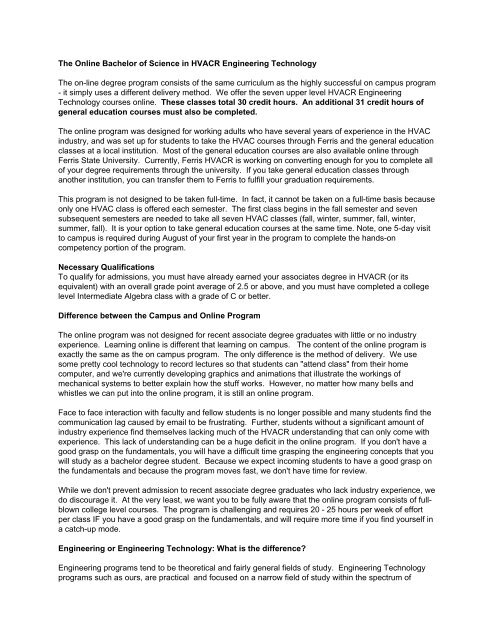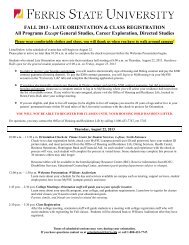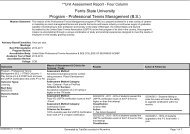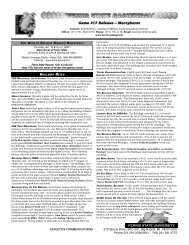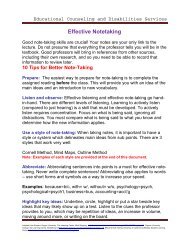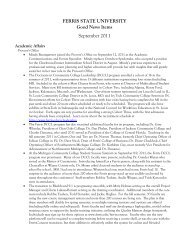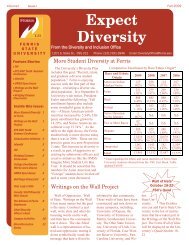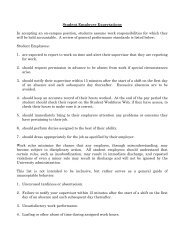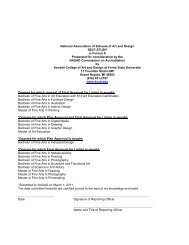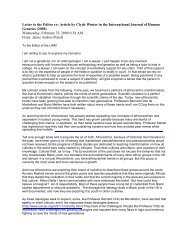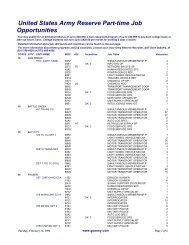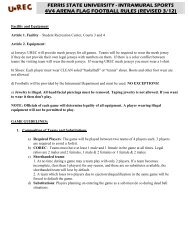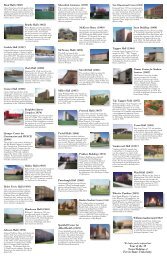The Online Bachelor of Science in HVACR Engineering Technology
The Online Bachelor of Science in HVACR Engineering Technology
The Online Bachelor of Science in HVACR Engineering Technology
Create successful ePaper yourself
Turn your PDF publications into a flip-book with our unique Google optimized e-Paper software.
<strong>The</strong> <strong>Onl<strong>in</strong>e</strong> <strong>Bachelor</strong> <strong>of</strong> <strong>Science</strong> <strong>in</strong> <strong>HVACR</strong> Eng<strong>in</strong>eer<strong>in</strong>g <strong>Technology</strong><br />
<strong>The</strong> on-l<strong>in</strong>e degree program consists <strong>of</strong> the same curriculum as the highly successful on campus program<br />
- it simply uses a different delivery method. We <strong>of</strong>fer the seven upper level <strong>HVACR</strong> Eng<strong>in</strong>eer<strong>in</strong>g<br />
<strong>Technology</strong> courses onl<strong>in</strong>e. <strong>The</strong>se classes total 30 credit hours. An additional 31 credit hours <strong>of</strong><br />
general education courses must also be completed.<br />
<strong>The</strong> onl<strong>in</strong>e program was designed for work<strong>in</strong>g adults who have several years <strong>of</strong> experience <strong>in</strong> the HVAC<br />
<strong>in</strong>dustry, and was set up for students to take the HVAC courses through Ferris and the general education<br />
classes at a local <strong>in</strong>stitution. Most <strong>of</strong> the general education courses are also available onl<strong>in</strong>e through<br />
Ferris State University. Currently, Ferris <strong>HVACR</strong> is work<strong>in</strong>g on convert<strong>in</strong>g enough for you to complete all<br />
<strong>of</strong> your degree requirements through the university. If you take general education classes through<br />
another <strong>in</strong>stitution, you can transfer them to Ferris to fulfill your graduation requirements.<br />
This program is not designed to be taken full-time. In fact, it cannot be taken on a full-time basis because<br />
only one HVAC class is <strong>of</strong>fered each semester. <strong>The</strong> first class beg<strong>in</strong>s <strong>in</strong> the fall semester and seven<br />
subsequent semesters are needed to take all seven HVAC classes (fall, w<strong>in</strong>ter, summer, fall, w<strong>in</strong>ter,<br />
summer, fall). It is your option to take general education courses at the same time. Note, one 5-day visit<br />
to campus is required dur<strong>in</strong>g August <strong>of</strong> your first year <strong>in</strong> the program to complete the hands-on<br />
competency portion <strong>of</strong> the program.<br />
Necessary Qualifications<br />
To qualify for admissions, you must have already earned your associates degree <strong>in</strong> <strong>HVACR</strong> (or its<br />
equivalent) with an overall grade po<strong>in</strong>t average <strong>of</strong> 2.5 or above, and you must have completed a college<br />
level Intermediate Algebra class with a grade <strong>of</strong> C or better.<br />
Difference between the Campus and <strong>Onl<strong>in</strong>e</strong> Program<br />
<strong>The</strong> onl<strong>in</strong>e program was not designed for recent associate degree graduates with little or no <strong>in</strong>dustry<br />
experience. Learn<strong>in</strong>g onl<strong>in</strong>e is different that learn<strong>in</strong>g on campus. <strong>The</strong> content <strong>of</strong> the onl<strong>in</strong>e program is<br />
exactly the same as the on campus program. <strong>The</strong> only difference is the method <strong>of</strong> delivery. We use<br />
some pretty cool technology to record lectures so that students can "attend class" from their home<br />
computer, and we're currently develop<strong>in</strong>g graphics and animations that illustrate the work<strong>in</strong>gs <strong>of</strong><br />
mechanical systems to better expla<strong>in</strong> how the stuff works. However, no matter how many bells and<br />
whistles we can put <strong>in</strong>to the onl<strong>in</strong>e program, it is still an onl<strong>in</strong>e program.<br />
Face to face <strong>in</strong>teraction with faculty and fellow students is no longer possible and many students f<strong>in</strong>d the<br />
communication lag caused by email to be frustrat<strong>in</strong>g. Further, students without a significant amount <strong>of</strong><br />
<strong>in</strong>dustry experience f<strong>in</strong>d themselves lack<strong>in</strong>g much <strong>of</strong> the <strong>HVACR</strong> understand<strong>in</strong>g that can only come with<br />
experience. This lack <strong>of</strong> understand<strong>in</strong>g can be a huge deficit <strong>in</strong> the onl<strong>in</strong>e program. If you don't have a<br />
good grasp on the fundamentals, you will have a difficult time grasp<strong>in</strong>g the eng<strong>in</strong>eer<strong>in</strong>g concepts that you<br />
will study as a bachelor degree student. Because we expect <strong>in</strong>com<strong>in</strong>g students to have a good grasp on<br />
the fundamentals and because the program moves fast, we don't have time for review.<br />
While we don't prevent admission to recent associate degree graduates who lack <strong>in</strong>dustry experience, we<br />
do discourage it. At the very least, we want you to be fully aware that the onl<strong>in</strong>e program consists <strong>of</strong> fullblown<br />
college level courses. <strong>The</strong> program is challeng<strong>in</strong>g and requires 20 - 25 hours per week <strong>of</strong> effort<br />
per class IF you have a good grasp on the fundamentals, and will require more time if you f<strong>in</strong>d yourself <strong>in</strong><br />
a catch-up mode.<br />
Eng<strong>in</strong>eer<strong>in</strong>g or Eng<strong>in</strong>eer<strong>in</strong>g <strong>Technology</strong>: What is the difference?<br />
Eng<strong>in</strong>eer<strong>in</strong>g programs tend to be theoretical and fairly general fields <strong>of</strong> study. Eng<strong>in</strong>eer<strong>in</strong>g <strong>Technology</strong><br />
programs such as ours, are practical and focused on a narrow field <strong>of</strong> study with<strong>in</strong> the spectrum <strong>of</strong>
eng<strong>in</strong>eer<strong>in</strong>g. Mechanical eng<strong>in</strong>eer<strong>in</strong>g students study a wide variety <strong>of</strong> eng<strong>in</strong>eer<strong>in</strong>g fundamentals and<br />
pr<strong>in</strong>ciples, but typically do not have any classes that are specifically designed to teach about <strong>HVACR</strong>.<br />
Upon graduation, some enter the <strong>HVACR</strong> <strong>in</strong>dustry, but most enter a variety <strong>of</strong> other <strong>in</strong>dustries that design<br />
mach<strong>in</strong>es, automobiles, airplanes, boats, eng<strong>in</strong>es and so on. Our students learn only those eng<strong>in</strong>eer<strong>in</strong>g<br />
pr<strong>in</strong>ciples that apply specifically to <strong>HVACR</strong> and concentrate <strong>in</strong>stead on eng<strong>in</strong>eer<strong>in</strong>g with<strong>in</strong> the <strong>HVACR</strong><br />
<strong>in</strong>dustry. Eng<strong>in</strong>eer<strong>in</strong>g students take several Calculus courses. Our students take only pre-Calculas<br />
(because Calculus is not used <strong>in</strong> the <strong>in</strong>dustry). Eng<strong>in</strong>eer<strong>in</strong>g students are required to take several<br />
Chemistry and Physics courses. Our students are required to take two <strong>Science</strong> courses <strong>of</strong> their choos<strong>in</strong>g<br />
(we recommend, but do not require, Physics). For an illustration <strong>of</strong> this, please see the attachment below<br />
for a list <strong>of</strong> classes <strong>in</strong> our program as compared to the classes found <strong>in</strong> a typical mechanical eng<strong>in</strong>eer<strong>in</strong>g<br />
program.<br />
Our program results <strong>in</strong> a <strong>Bachelor</strong> <strong>of</strong> <strong>Science</strong> <strong>in</strong> <strong>HVACR</strong> Eng<strong>in</strong>eer<strong>in</strong>g <strong>Technology</strong>, while a typical<br />
mechanical eng<strong>in</strong>eer<strong>in</strong>g program results <strong>in</strong> a <strong>Bachelor</strong> <strong>of</strong> <strong>Science</strong> <strong>in</strong> Mechanical Eng<strong>in</strong>eer<strong>in</strong>g (BSME).<br />
A "pure" eng<strong>in</strong>eer<strong>in</strong>g program is accredited by the Eng<strong>in</strong>eer<strong>in</strong>g Accreditation Commission (EAC) <strong>of</strong> the<br />
Accreditation Board <strong>of</strong> Eng<strong>in</strong>eer<strong>in</strong>g <strong>Technology</strong> (ABET). ABET sets the standards for quality assurance<br />
<strong>of</strong> eng<strong>in</strong>eer<strong>in</strong>g programs and requires that students take certa<strong>in</strong> core eng<strong>in</strong>eer<strong>in</strong>g courses, such as those<br />
conta<strong>in</strong>ed <strong>in</strong> the attachment above for mechanical eng<strong>in</strong>eer<strong>in</strong>g programs. Our program is not accredited<br />
by ABET, because we would have to replace many <strong>of</strong> our core HVAC classes with ABET required<br />
courses. Do<strong>in</strong>g so would elim<strong>in</strong>ate our unique niche <strong>in</strong> higher education and remove our specialization <strong>in</strong><br />
<strong>HVACR</strong>. In short, we would no longer be able to <strong>of</strong>fer a degree <strong>in</strong> <strong>HVACR</strong>.<br />
This is both good and bad. Here is why. A pr<strong>of</strong>essional eng<strong>in</strong>eer (PE) is a person that has graduated<br />
from an ABET accredited program and has passed a state test. <strong>The</strong> difference between an eng<strong>in</strong>eer and<br />
a pr<strong>of</strong>essional eng<strong>in</strong>eer is similar to the difference between an accountant and a certified public<br />
accountant (CPA). Both perform the same work, but one has passed a state exam and is qualified to<br />
certify the accuracy <strong>of</strong> an audit (<strong>in</strong> the case <strong>of</strong> an accountant), or a design (<strong>in</strong> the case <strong>of</strong> an eng<strong>in</strong>eer).<br />
Graduates <strong>of</strong> programs accredited by ABET are qualified to take the PE exams, while graduates <strong>of</strong> the<br />
<strong>HVACR</strong> Eng<strong>in</strong>eer<strong>in</strong>g <strong>Technology</strong> program at Ferris are not.<br />
This leaves you with a choice: Study at any one <strong>of</strong> a number <strong>of</strong> universities that <strong>of</strong>fer ABET accredited<br />
eng<strong>in</strong>eer<strong>in</strong>g degrees, learn very little about <strong>HVACR</strong> but become a PE upon graduation; or study at Ferris<br />
State and learn <strong>HVACR</strong> Eng<strong>in</strong>eer<strong>in</strong>g <strong>Technology</strong> <strong>in</strong> depth, but do not become a PE.<br />
Earn<strong>in</strong>g a PE does not assure employability or mean that you will earn more dur<strong>in</strong>g your career. Some<br />
eng<strong>in</strong>eer<strong>in</strong>g firms will hire only PE's, so you may have more opportunities with a PE. Often, firms will hire<br />
our graduates to actually do the design work and have their PE review the designs to certify that they are<br />
valid.<br />
Note that our program builds on the AAS <strong>in</strong> <strong>HVACR</strong> and requires two additional years. A mechanical<br />
eng<strong>in</strong>eer<strong>in</strong>g degree requires four years <strong>of</strong> study, whether you already have an AAS <strong>in</strong> <strong>HVACR</strong> or not.<br />
Other Facts to Consider<br />
If you are work<strong>in</strong>g full time and tak<strong>in</strong>g onl<strong>in</strong>e classes, usually one class per semester is plenty. <strong>The</strong><br />
onl<strong>in</strong>e program takes two years and one semester to complete the technical courses. And additional 31<br />
credits <strong>of</strong> non-HVAC courses need to be taken as well. If you take just one class per semester, the<br />
program could easily take you five years to complete onl<strong>in</strong>e. <strong>The</strong> campus program takes two academic<br />
years to complete. In short, you can get through the campus program faster than the onl<strong>in</strong>e program, and<br />
you can concentrate on your studies while you are here without the distraction <strong>of</strong> your career. Obviously,<br />
tak<strong>in</strong>g the course onl<strong>in</strong>e allows you to work and earn an <strong>in</strong>come while you attend school and from a<br />
f<strong>in</strong>ancial perspective, that is a very attractive option.


